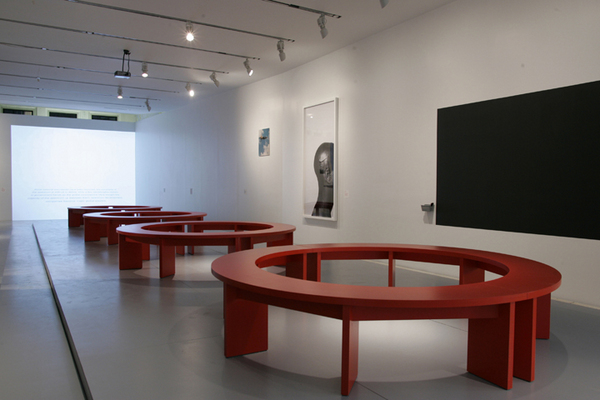This is an archive of the ArtCat Zine, 2007-2009. Please visit our new project, IDIOM.
Democracy as Fun Fair

OURS: Democracy in the Age of Branding
Sheila C. Johnson Design Center - Parsons
66 Fifth Avenue at 13th Street, New York
Through February 1
I'm not convinced that OURS: Democracy in the Age of Branding actually goes very far in exploring the relationship it sets out to. Which is a shame because that questioning -- the extent to which democracy has or has not ceased to be a determinant political reality by virtue of a sort of large scale semiotic reorganization privileging the brand as such -- is a very compelling and urgent one. And if this is a decidedly disappointing aspect of OURS..., it is perhaps the only one. Indeed, it seems best to read the curatorial architecture of this show, title included, as merely another fascinating take on the material at hand in what is an excellent, even delightful presentation full of them.
I don't mean to suggest that there is no overriding political theme here, there is, and its easily the most satisfying interrogation of democracy I've encountered in the gallery space. It's just that pulling apart aspects of democracy doesn't necessarily become as investigation of the thing as a brand. It stays, quite simply, an investigation of democracy -- certainly not an uninteresting project, especially when it is done with verve and with such obvious joy. The space is so active and stimulating, it feels as though everybody’s favorite activist artists took over the science museum.
Maybe the best way of describing OURS... is that it is the sort of space in which the Liam Gillick at its center (several large circular structures geared toward, while also troubling, participation) not only seems to make materialist sense, but actually seems at home. It is as though we are finally relieved of having to imagine what Gillick is summoning with his softly optimistic hard candy design; here its just smeared all over the everything, and it turns out its as good as he always told us it would be.
If no other work is quite as well served by the layout, it is probably because no other artist has been as willing to engage in the sort of unforgiving contextual investigation that Gillick has spent a career pursuing – that and some of them seem tossed in for good measure. Still not sure you're getting enough? Well here’s Paul Chan’s Lynne Stewart video, over next to the Anri Salle on loop in the mock voting booth and the giant, two headed snake, hanging in segments from the ceiling – look its electromagnatized! There’s vending machines involving urinating hens, a sneaker installation, web access where you can review the show, giant blackboards asking for your definition of various key terms, numerous free posters and, if you don’t like the ones on offer, there is an entire poster production facility, involving glue sticks and the coolest collection of rubber stamps below 42nd street. Each poster made by visitors is scanned and put up on the web, and every week several are selected to be blown up and placed in the window. Top that, actually existing democracy!
If that still isn’t enough, there is an entire program of talks, lectures and charettes -- a concept that apparently originated with design but may have been synthesized out of whole cloth for the purposes of this exhibition -- its just that (refreshingly) ambitious. Which brings me back to the title: though branding is certainly in question here, most clearly in Hank Willis Thomas’ and Trevor Paglen’s work, I’m just not convinced that that relationship really exhausts all that is going on this show. Actually, I kind of like it that way. Working through the myriad pathways within the exhibition, its clear that half a dozen or so titles would all have applied equally well -- and for all I know there is an upcoming charrette devoted to synthesizing new ones -- and branding does beg precisely that question. Why not change titles every week? In any case, OURS: Democracy in the Age of Branding gets your attention, gets you thinking, and if there’s some great ill-served trope at work here that cries out for redress, one is free to make a poster about it, they’d probably even hang it in the window. And if that still isn’t enough, than that’s entirely the point.
ZINE
HOME
TIPS / COMMENTS
CATEGORIES
CONTRIBUTORS
- Greg Afinogenov
- B. Blagojevic
- Adda Birnir
- Susannah Edelbaum
- Julie Fishkin
- Paddy Johnson
- Jessica Loudis
- Christopher Reiger
- Andrew Robinson
- Peter J. Russo
- Blythe Sheldon
- S.C.Squibb
- Hrag Vartanian
